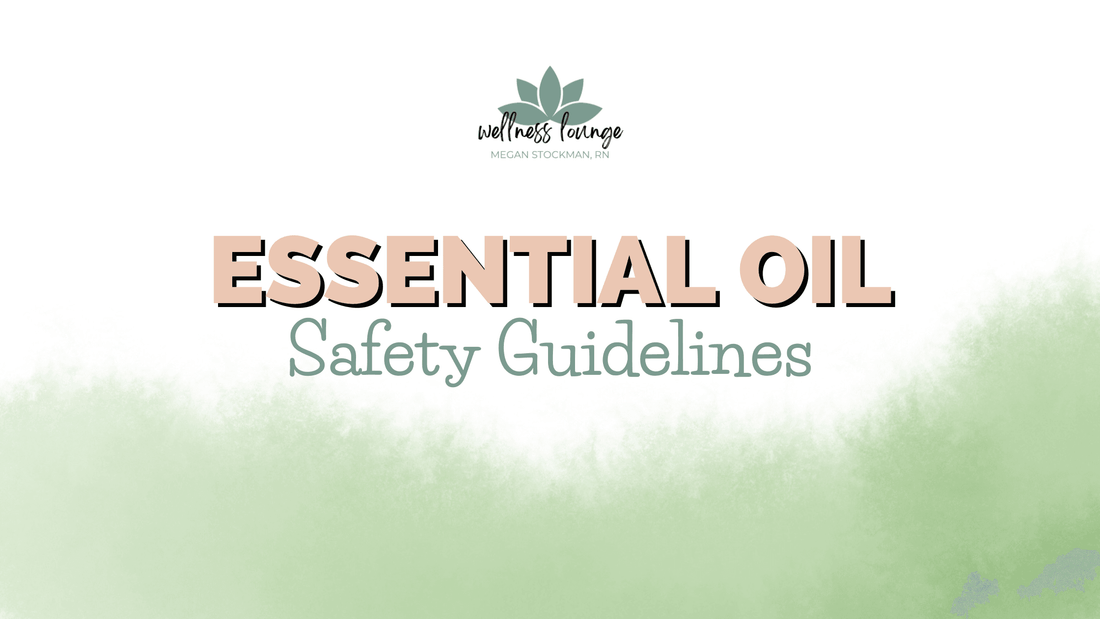
Essential Oil Safety Guidelines
Share
Essential oils are highly concentrated plant extracts that can provide powerful wellness benefits—but they must be used correctly and safely. This essential oil safety guide can help you! When misused, they can cause skin irritation, allergic reactions, or even toxicity.
I'll be honest - when I first started using essential oils, I had no idea what I was doing. I wanted to be sure I was doing this right and following all the tips to use the oils safely. Over the years, I've found that essential oils are much easier and much safer than I originally thought!
Follow these essential oil safety tips to ensure you get all the benefits—without the risks!

Essential Oil Safety Guidelines
1. Always Dilute Before Applying to Skin
Essential oils should never be applied directly to the skin. Instead, mix them with a carrier oil like coconut oil, almond oil, or jojoba oil before use. This prevents damage to your skin from "hot" oils and will help you avoid skin irritation at the application site.
Basic Dilution Guide:
- Adults: 1-3 drops of essential oil per teaspoon of carrier oil
- Children: 1 drop of essential oil per tablespoon of carrier oil
2. Not All Essential Oils Are Safe for Everyone
Just like not everyone loves essential oils, not every one should use them either. Every member of your family can learn essential oil safety, but certain essential oils should be avoided by:
- Pregnant women (e.g., clary sage, rosemary, cinnamon)
- Young children (e.g., peppermint, eucalyptus)
- Pets (e.g., tea tree, citrus oils, pine)
3. Store Essential Oils Properly
Essential oils should be stored in dark glass bottles, away from heat and sunlight, to maintain their potency and effectiveness. Proper storage improves essential oil safety and can help get the most benefit from each oil you store. All of our essential oils arrive in amber glass bottles to take the guesswork out of properly storing your oils!
4. Never Ingest Essential Oils
Even if an essential oil is labeled "pure" or "therapeutic grade," do not ingest it. Essential oils are highly concentrated and can cause serious harm if taken internally.
Yes, there are many companies out there who say that ingesting oils is perfectly safe, but to be honest... you don't need to ingest them. Anything you apply to your skin is absorbed in 26 seconds, and you can feel the benefits quite quickly. No need to wait while the oil travels through your digestive system - and no need to damage all the sensitve tissues inside your body! Essential oils from Jordan Essentials are pure, therapeutic grade and safe for applying to the skin. We do not recommend you ingest them!
5. Know Which Oils Are Phototoxic
Some citrus oils (like lemon, bergamot, and grapefruit) can make skin extra sensitive to the sun. If you apply them topically, avoid direct sun exposure for at least 12 hours. Diluting the citrus oils can lessen the phototoxic parts, but it still is a good idea to avoid the direct sun once you've applied it.
6. Diffuse with Caution
Essential oils can be a great way to freshen the air and support wellness, but:
- Use a water-based diffuser to prevent overpowering the air.
- Limit diffusion to 30-60 minutes at a time to avoid respiratory irritation.
- Make sure pets and children have an oil-free space to retreat to when diffusing.
Before we go...
Essential oils can be a safe and natural way to support wellness—as long as they’re used correctly! Keep these safety tips in mind so you can enjoy all the benefits without the risks.
Want to learn more about Essential Oils? Check out more information here.

 https://meganstockman.com
https://meganstockman.com